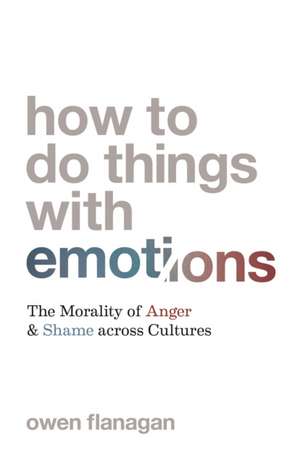How to Do Things with Emotions – The Morality of Anger and Shame across Cultures
Autor Owen Flanaganen Limba Engleză Paperback – 3 apr 2023
| Toate formatele și edițiile | Preț | Express |
|---|---|---|
| Paperback (1) | 134.72 lei 22-36 zile | +15.88 lei 6-12 zile |
| Princeton University Press – 3 apr 2023 | 134.72 lei 22-36 zile | +15.88 lei 6-12 zile |
| Hardback (1) | 226.23 lei 22-36 zile | +24.07 lei 6-12 zile |
| Princeton University Press – 3 ian 2022 | 226.23 lei 22-36 zile | +24.07 lei 6-12 zile |
Preț: 134.72 lei
Nou
25.78€ • 26.99$ • 21.33£
Carte disponibilă
Livrare economică 17-31 martie
Livrare express 01-07 martie pentru 25.87 lei
Specificații
ISBN-10: 0691220999
Pagini: 328
Dimensiuni: 140 x 216 x 23 mm
Greutate: 0.39 kg
Editura: Princeton University Press
Notă biografică
Descriere
An expansive look at how culture shapes our emotions--and how we can benefit, as individuals and a society, from less anger and more shame
The world today is full of anger. Everywhere we look, we see values clashing and tempers rising, in ways that seem frenzied, aimless, and cruel. At the same time, we witness political leaders and others who lack any sense of shame, even as they display carelessness with the truth and the common good. In How to Do Things with Emotions, Owen Flanagan explains that emotions are things we do, and he reminds us that those like anger and shame involve cultural norms and scripts. How we do these emotions is not guaranteed to support emotionally and ethically balanced lives. But we can control and change how they are done if necessary. Flanagan makes a passionate case for tuning down anger and tuning up shame, and he observes how cultures around the world can show us how to cultivate these emotions better.
Through comparative insights from anthropology, psychology, and crosscultural philosophy, Flanagan reveals an incredible range in the expression of anger and shame across societies. He establishes that certain types of anger--such as those that lead to revenge or passing hurt on to others--are more destructive than we imagine. Certain forms of shame, on the other hand, can protect positive values, including courage, kindness, and honesty. Flanagan proposes that we should embrace shame as a uniquely socializing emotion, one that can promote moral progress where undisciplined anger cannot.
How to Do Things with Emotions celebrates the plasticity of our emotional responses--and our freedom to recalibrate them in the pursuit of more fulfilling lives.
